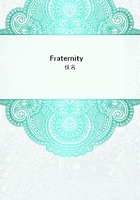
第31章
In due accord with the old butler's comment on his looks, Hilary had felt so young that, instead of going home, he mounted an omnibus, and went down to his club--the "Pen and Ink," so called because the man who founded it could not think at the moment of any other words.
This literary person had left the club soon after its initiation, having conceived for it a sudden dislike. It had indeed a certain reputation for bad cooking, and all its members complained bitterly at times that you never could go in without meeting someone you knew.
It stood in Dover Street. Unlike other clubs, it was mainly used to talk in, and had special arrangements for the safety of umbrellas and such books as had not yet vanished from the library; not, of course, owing to any peculative tendency among its members, but because, after interchanging their ideas, those members would depart, in a long row, each grasping some material object in his hand. Its. maroon-coloured curtains, too, were never drawn, because, in the heat of their discussions, the members were always drawing them. On the whole, those members did not like each other much; wondering a little, one by one, why the others wrote; and when the printed reasons were detailed to them, reading them with irritation. If really compelled to hazard an opinion about each other's merits, they used to say that, no doubt "So-and-so" was "very good," but they had never read him! For it had early been established as the principle underlying membership not to read the writings of another man, unless you could be certain he was dead, lest you might have to tell him to his face that you disliked his work. For they were very jealous of the purity of their literary consciences. Exception was made, however, in the case of those who lived by written criticism, the opinions of such persons being read by all, with a varying smile, and a certain cerebral excitement. Now and then, however, some member, violating every sense of decency, would take a violent liking for another member's books. This he would express in words, to the discomfort of his fellows, who, with a sudden chilly feeling in the stomach, would wonder why it was not their books that he was praising.
Almost every year, and generally in March, certain aspirations would pass into the club; members would ask each other why there was no Academy of British Letters; why there was no concerted movement to limit the production of other authors' books; why there was no prize given for the best work of the year. For a little time it almost seemed as if their individualism were in danger; but, the windows having been opened wider than usual some morning, the aspirations would pass out, and all would feel secretly as a man feels when he has swallowed the mosquito that has been worrying him all night--relieved, but just a little bit embarrassed. Socially sympathetic in their dealings with each other--they were mostly quite nice fellows--each kept a little fame-machine, on which he might be seen sitting every morning about the time the papers and his correspondence came, wondering if his fame were going up.
Hilary stayed in the club till half-past nine; then, avoiding a discussion which was just setting in, he took his own umbrella, and bent his steps towards home.
It was the moment of suspense in Piccadilly; the tide had flowed up to the theatres, and had not yet begun to ebb. The tranquil trees, still feathery, draped their branches along the farther bank of that broad river, resting from their watch over the tragi-comedies played on its surface by men, their small companions. The gentle sighs which distilled from their plume-like boughs seemed utterances of the softest wisdom. Not far beyond their trunks it was all dark velvet, into which separate shapes, adventuring, were lost, as wild birds vanishing in space, or the souls of men received into their Mother's heart.